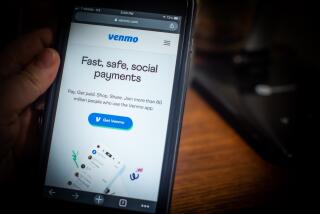What to Look Out For
- Share via
Should you be worried about the security of your money with an online bank?
Perhaps not worried, but definitely cautious, experts say.
Though online banks have gone to great lengths to protect the safety of customer accounts by erecting multilayered firewalls and complex encryption systems, such banking does present certain risks by its very nature. After all, an online bank can’t know what you look like or ask to see your driver’s license if you want to withdraw a lot of money. Instead, both bank and customer must rely on a system of personal identification numbers and passwords.
Typically, Web banks will allow only a few attempts at typing an account’s identification numbers correctly before it will lock up the account on the assumption that somebody else is trying to guess your code.
You’re probably not foolish enough to give your PIN to someone untrustworthy. But you could give it out unwittingly, through a process called spoofing, says Jim Bruene, editor of the Online Banking Report in Seattle.
“Spoofers” set up a copycat Web site at an address that’s very similar to that of a legitimate online bank [or other online business]. You see a start page that looks like the one for your bank, so you proceed to tap in all your personal identifying information. Later, the operators of the copycat site use that information to access your account, Bruene says.
Many cyber-banks have taken a variety of precautions to prevent spoofing of their customers. For instance, WingspanBank.com purchased virtually every similar domain name it could find, says Michael Cleary, the company’s president. That way, if you mis-type, you’ll still get Wingspan. Other banks contract with a company called Verisign, which allows you to verify that you’ve hit the right site with a simple click.
Consumers, however, would be wise to simply double-check that they’ve typed the address correctly whenever they sign on to do their banking.
Before you decide to open an account at an online bank, be sure that it is a legitimate institution. Don’t assume that just because the word “bank” is in its name, it actually is one. Real banks must have a state or federal charter and be insured by the Federal Deposit Insurance Corp. The FDIC stands behind customer deposits of up to $100,000. Most legitimate online banks post the FDIC logo on their sites, but in any case, it can never hurt to check directly with the FDIC. Its Web site is at https://www.fdic.gov.
Finally, realize that online banks, just like their brick-and-mortar cousins, are increasingly likely to be selling non-bank investment products. If you buy shares in a mutual fund, or company stocks or bonds, you are subject to market risks: That means you can lose principal, regardless of whether you purchased those products from a bank or from a broker. Make sure you pay attention to all investment disclosures and regularly monitor your accounts, no matter where you transact your investment business.


